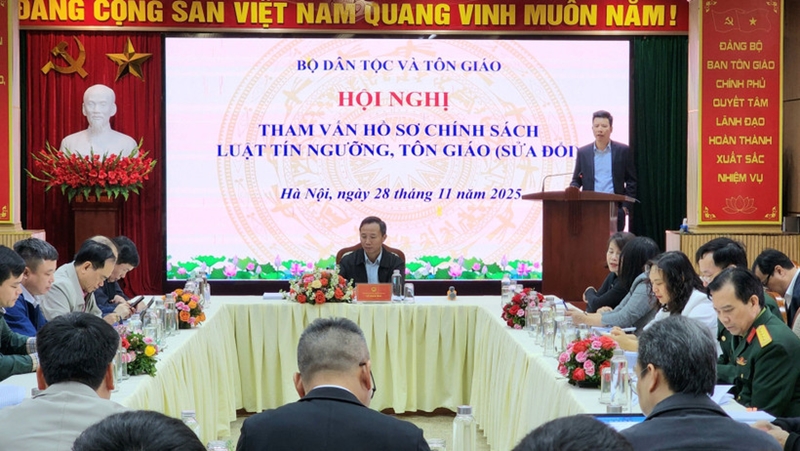Outlining three key policy updates in the amended law, Nguyen Tien Trong, deputy head of the Government Committee for Religious Affairs under the Ministry of Ethnic and Religious Affairs, noted that the 2016 Law on Belief and Religion does not include provisions regarding religious or belief activities in cyberspace.
    |
 |
|
The consultation takes place in Hanoi on November 28. |
In reality, however, certain representatives of belief establishments, religious practitioners, and religious organizations have been using information technology and online platforms to disseminate religious teachings, organize belief and religious activities, and connect with their communities and followers.
The draft outlines rules for belief and religious activities in cyberspace, aiming to create clear, consistent laws that support diverse forms of these activities. They seek to provide a transparent, open, and convenient space for individuals and organizations to engage in such activities online quickly and effectively. The draft also sets out the duties of those involved, including individuals, organizations, state agencies, telecom companies, and internet service providers, to improve flexibility, ease of use, and timely access to information that meets the public’s needs around belief and religion.
It also simplifies administrative procedures and promotes digital transformation in the field of belief and religion. Currently, the forms, processes, and procedures for administrative tasks in this sector remain insufficiently flexible to suit the practical conditions at the grassroots level.
At the conference, participants appreciated the close coordination between the Ministry of Ethnic and Religious Affairs and relevant ministries, sectors, localities, and religious organizations in reviewing the implementation of the 2016 law, identifying the achievements while frankly assessing limitations and shortcomings from reality to propose comprehensive amendments that meet new requirements.
According to Senior Colonel Vu Thanh Minh, Deputy Director of the Mass Mobilization Department under the Ministry of National Defense, in recent years, the Party’s and the State’s guidelines and policies on religion have continued to be improved. Religious activities have remained stable, and many moral and humanitarian values have been promoted in social life.
The Vietnam People’s Army sees mass mobilization, especially engaging with religious communities, as a key political mission. This effort helps build trust among religious leaders and followers, particularly in remote, border, and island regions.
However, many new issues have emerged in practice. Religious activities are increasingly diverse and expanding into the digital space. Many religious organizations use social networks and cross-border platforms for evangelization and mobilization, posing challenges for management. Some organizations and individuals take advantage of religion to promote superstition and provoke disturbances, affecting political and social stability in ethnic minority and border areas, Minh noted.
The Ministry of National Defense agreed that the amendment of the law must ensure a balance of three requirements: respecting and guaranteeing the people’s right to freedom of belief and religion without discrimination; strengthening the effectiveness of state management to ensure that religious activities are conducted in accordance with law, transparently and stably; and meeting the requirements of safeguarding sovereignty and national security, especially in strategic areas such as border regions, islands, ethnic minority areas, and cyberspace.
Vu Trung Kien, Deputy Chief of the Office of the Ministry of Ethnic and Religious Affairs, agreed on the need to clearly define the responsibilities of those operating in cyberspace to address the current legal gaps. However, he proposed further consideration of mandatory principles, legal responsibilities, and mechanisms for preventing violations. Regulations should have clear, enforceable rules requiring individuals and organizations to block or remove offending content within 24 hours of a request from an authorized state body. They should also outline the duties of telecom companies and internet service providers in stopping the spread of such material.
Kien also emphasized the need to strengthen decentralization and delegation of authority to provincial- and commune-level People’s Committees, and to continue reviewing and streamlining administrative procedures in a way that does not create new ones.
Source: VNA